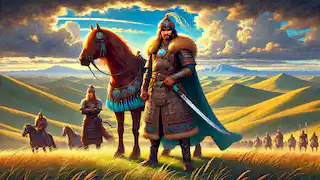Introduction
The tale of Alpamysh is an ancient and legendary epic that has been passed down through the generations of Uzbek people. It is a powerful story filled with themes of loyalty, love, courage, and the struggle for justice. Alpamysh, the heroic warrior, is central to the story, known for his unparalleled strength, valor, and dedication to his people. This tale takes us on a journey through the steppes, battlefields, and heart-wrenching moments that define the life of a hero bound by honor and destiny.
The epic is not just a story of one man’s deeds but also a reflection of the cultural values and traditions that have shaped the Uzbek identity. This version of the story has been adapted to capture the essence of Alpamysh while maintaining the narrative style of traditional oral storytelling, enriched with vivid imagery and a dramatic unfolding of events.
The Birth of a Hero
In the land of Baysun, nestled in the vast steppes of Central Asia, there was a mighty tribe known as the Kungrats. Among them, Baybora, a noble and respected leader, lived a life of contentment with his wife, Qaldirgach. For many years, however, their household was marked by one sorrow—they were without a child. Desiring an heir who could continue his legacy, Baybora often looked to the heavens, seeking divine intervention.
One day, after years of waiting, a miracle happened. Qaldirgach gave birth to a son, whom they named Alpamysh. From the moment he entered the world, Alpamysh showed signs of greatness. His robust frame and intense gaze foretold his future as a warrior destined for glory. As the child grew, he displayed remarkable strength and intelligence, impressing all who came to know him.
Baybora ensured that his son was trained in the ways of a warrior. Alpamysh excelled in every discipline—horseback riding, archery, swordsmanship, and strategy. His name soon spread across the lands as the strongest and bravest young man in the region. With his childhood friend and brother-in-arms, Qarajan, Alpamysh stood ready to defend his tribe from any threat.
Love and Loyalty
At the age of seventeen, Alpamysh had already proven himself to be a valiant warrior. His heart, however, belonged to Barchin, the beautiful daughter of Baysari, a respected elder of the neighboring tribe. Their love was strong, but as with all great romances, it was not without its challenges.
Barchin’s father, Baysari, found himself in a difficult position. His tribe was threatened by Taychihan, a cruel and ambitious ruler who sought to claim Barchin’s hand in marriage as a means to consolidate power. Baysari, desperate to protect his daughter and his people, declared that Barchin’s suitor would have to win her hand in a great contest—a contest that would test the strength, skill, and wisdom of all those who sought her favor.
Alpamysh, though in love with Barchin, knew that the contest would be perilous. Many powerful and cunning men would compete, and the stakes were high. Nonetheless, his love for Barchin gave him the courage to face any challenge. With Qarajan by his side, Alpamysh set out to win the hand of his beloved, determined to prove himself worthy.
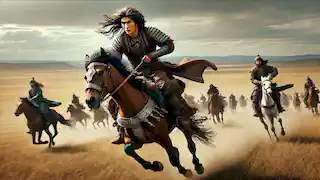
The Contest for Barchin’s Hand
The contest was held over several days, with warriors and noblemen from distant lands arriving to participate. The trials included tests of strength, endurance, and cunning. Barchin, though bound by tradition, watched the contest with a hopeful heart, secretly praying for Alpamysh’s victory.
The first trial was a race across the steppe on horseback, a grueling test of both rider and horse. Alpamysh, astride his loyal steed Baychobar, rode like the wind, leaving his competitors far behind. His mastery of horsemanship was unrivaled, and he easily won the race.
The second trial tested the warriors’ ability to shoot arrows with deadly accuracy. Once again, Alpamysh’s skill shone through as he hit every target with precision, even the most distant and difficult ones. The crowd watched in awe, and murmurs of his inevitable victory began to spread.
But the third trial was the most dangerous of all. Each suitor had to face the dreaded wild boar of the steppe, a creature feared for its size, strength, and ferocity. Armed only with a spear, Alpamysh confronted the beast without hesitation. In a fierce and bloody battle, Alpamysh managed to slay the boar, proving not only his physical strength but also his courage.
Despite these victories, Taychihan, who had also competed in the contest, was not willing to accept defeat. He sought to sabotage Alpamysh, using trickery and deceit in an attempt to win Barchin’s hand by any means necessary. Alpamysh, however, was no fool. With Qarajan’s help, he uncovered Taychihan’s schemes and exposed him as a coward and a cheat.
In the end, Alpamysh won the contest and the hand of Barchin. The two were united in love, but their happiness was short-lived. Taychihan, humiliated and enraged by his defeat, vowed revenge. He fled the region, but his thirst for power and vengeance would soon bring greater challenges to Alpamysh and his people.
A Call to Arms
Several months after their wedding, Alpamysh and Barchin settled into a peaceful life, but their joy was soon shattered. Word came that Taychihan had raised an army and was marching toward their lands. He intended to conquer the Kungrats and take Barchin by force.
Alpamysh, knowing that war was inevitable, rallied his people. He called upon the warriors of the tribe, urging them to stand firm against the invaders. Qarajan, ever loyal, stood by his side, and together they prepared for the coming battle.
The army of Taychihan was vast, far outnumbering the forces of Alpamysh. Yet Alpamysh knew that victory was not always determined by numbers. His people fought for their homes, their families, and their freedom, while Taychihan’s soldiers fought for greed and ambition. Alpamysh devised a strategy that would exploit the weaknesses in Taychihan’s army, using the terrain to their advantage and launching surprise attacks on key positions.
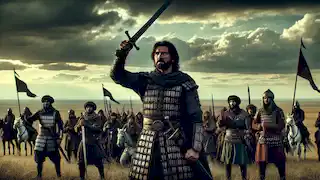
The Battle of the Steppes
The battle began at dawn, with the clash of steel and the thunder of hooves echoing across the plains. Alpamysh, at the forefront of his army, fought with unmatched fury. His sword cut through the ranks of the enemy, and his presence inspired his warriors to fight with even greater determination.
Despite the overwhelming numbers of Taychihan’s forces, Alpamysh’s strategic brilliance turned the tide of the battle. Using swift cavalry maneuvers, his warriors outflanked the enemy, cutting off their supply lines and forcing them into a retreat. As the day wore on, it became clear that Alpamysh and his army were winning the battle.
In a final act of desperation, Taychihan challenged Alpamysh to single combat, hoping to end the war with a duel. Alpamysh accepted, knowing that this was his chance to bring an end to the bloodshed. The two warriors faced off in a fierce battle, their swords clashing in a flurry of strikes. In the end, it was Alpamysh who emerged victorious, delivering the final blow that ended Taychihan’s life and his threat to the Kungrats.
The battle was won, and peace returned to the land. Alpamysh, though weary from the fight, was hailed as a hero by his people. His victory not only ensured the safety of his tribe but also solidified his place in history as one of the greatest warriors of the steppes.
The Journey Home
With the war behind him, Alpamysh returned home to Barchin, who had awaited his return with bated breath. Their reunion was a moment of joy, and the people of the tribe celebrated for days, honoring their hero and his beloved.
However, Alpamysh’s journey was not over. He knew that his role as a leader required more than just strength in battle. He sought to unite the neighboring tribes, bringing peace and prosperity to the region. With Barchin by his side, he set out on a diplomatic mission, forging alliances and securing the future of his people.
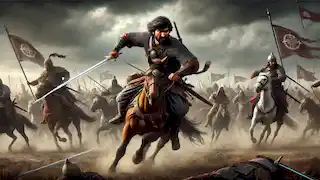
The Legacy of Alpamysh
Alpamysh’s legacy continued to grow long after his death. His deeds were immortalized in songs and stories, passed down through generations. The epic of Alpamysh became a symbol of courage, loyalty, and justice for the Uzbek people, inspiring countless others to stand up for what is right and to fight for their beliefs.
The tale of Alpamysh is not just a story of a warrior’s life, but a reflection of the human spirit’s indomitable will to overcome adversity. His strength, his love for Barchin, and his dedication to his people serve as a timeless reminder of the values that define true heroism.
In the hearts of the Uzbek people, Alpamysh lives on as a symbol of their cultural identity and their enduring connection to the past. The epic continues to be celebrated in festivals, songs, and literature, ensuring that the legend of Alpamysh will never be forgotten.
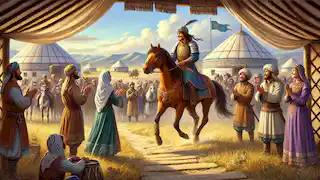
Conclusion
The epic of Alpamysh is one of
Uzbekistan’s greatest cultural treasures, encapsulating the spirit of a people who have faced many challenges throughout history. Alpamysh’s tale of bravery, loyalty, and love resonates across time, inspiring those who hear it to reflect on the values that guide their lives. In this retelling, we honor the legacy of Alpamysh and the lessons his story imparts to future generations.
